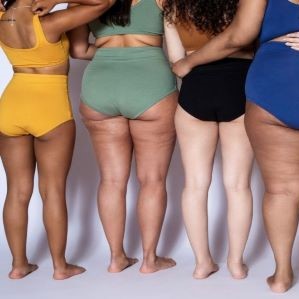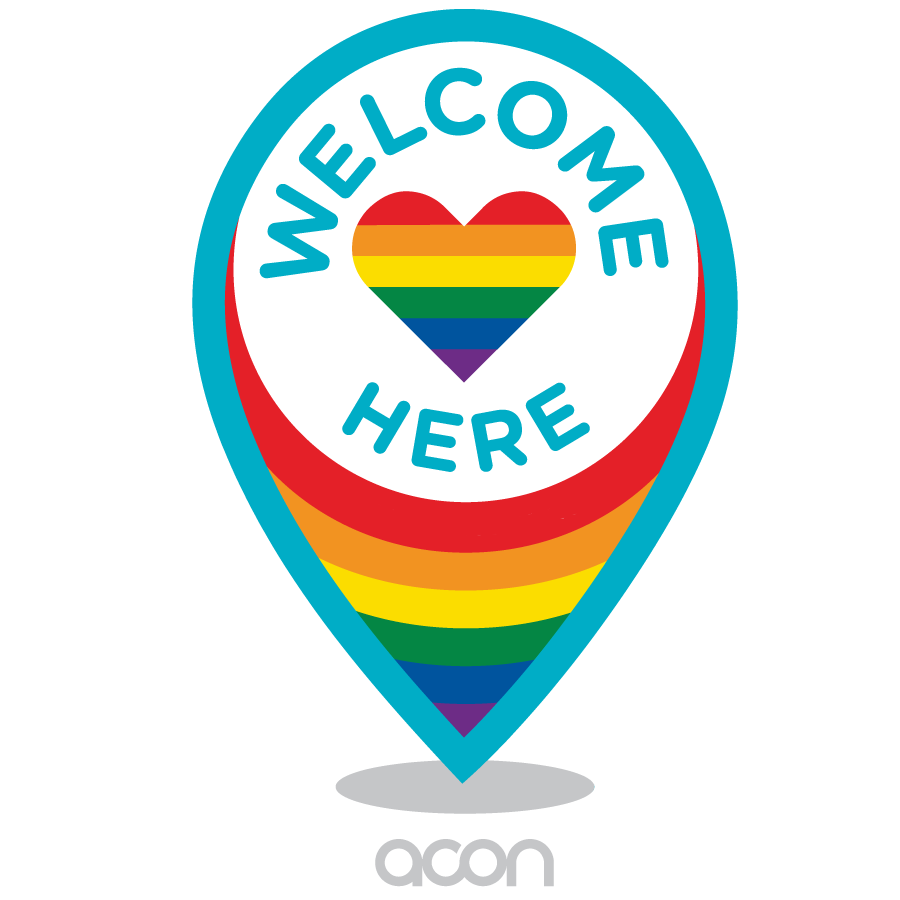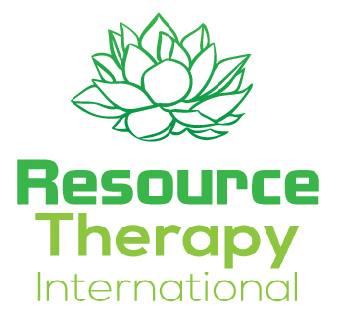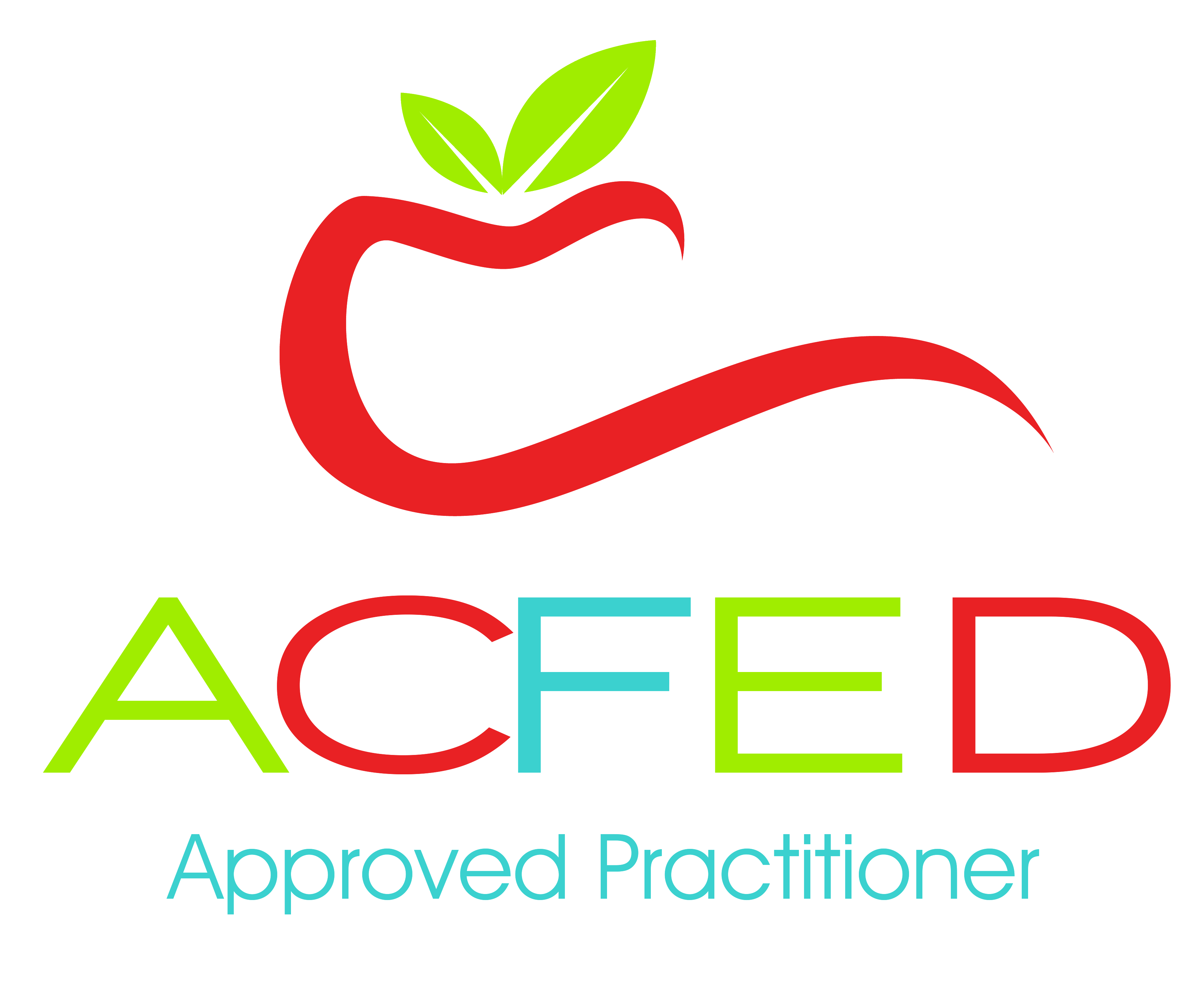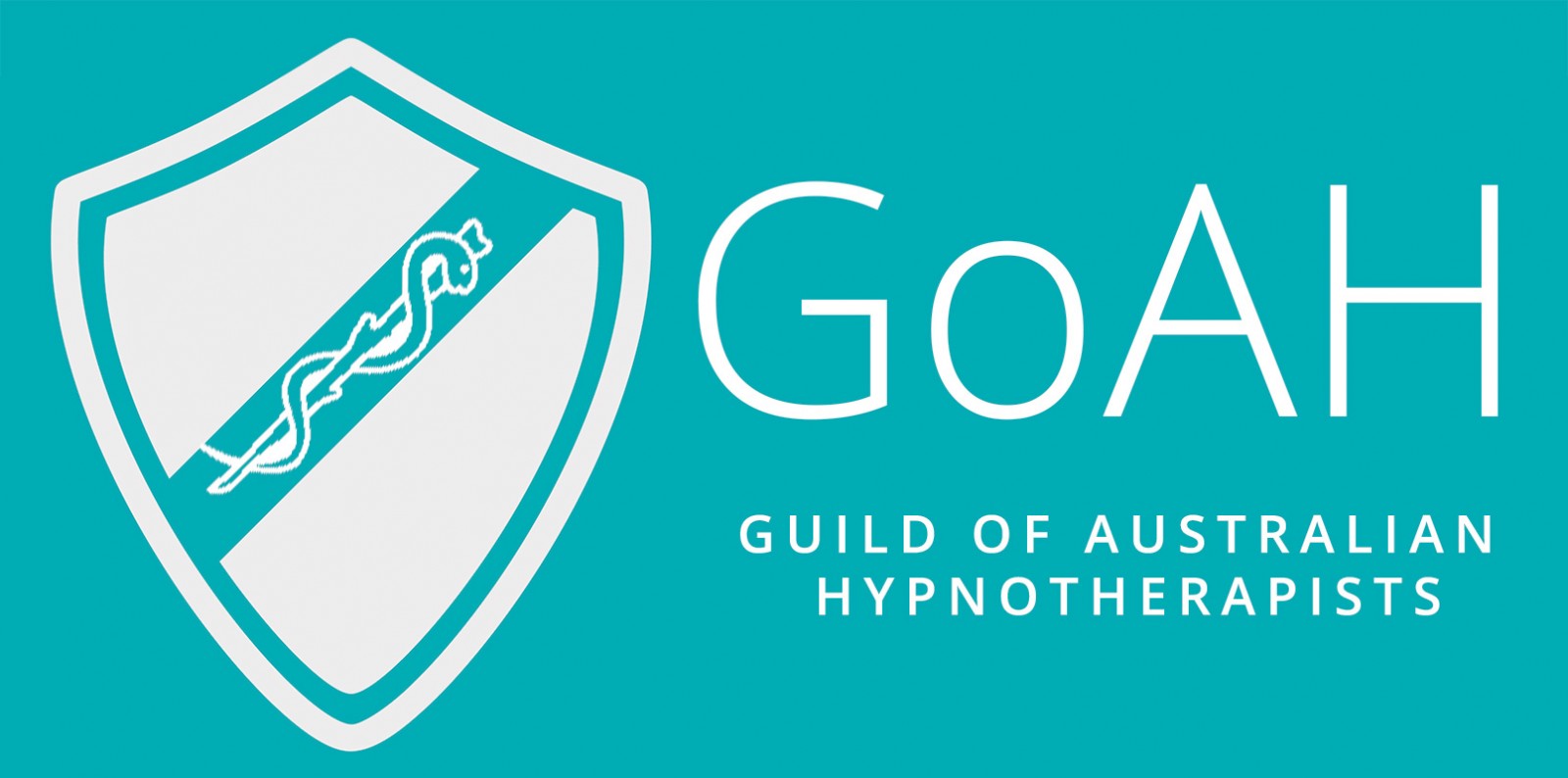Living with Grief in Recovery
1st August 2020 | Author: Bianca Skilbeck

Eating disorder recovery. Grief. And wait, what......conspiracy theories?? What could they possibly have in common?
Seemingly nothing….yet in many ways, maybe everything.
When I decided to write this piece, I’ll admit that I ran in to some writer’s block.
Where the hell do I start?
I could put on my academic hat and refer to theories and research that might be interesting or informative. No, that doesn’t feel right. We’ve been there before.
Perhaps I could write some sort of self-help-style article; outlining processes, making connections and showing how this all applies to you? Hhmm, I don’t know, that still feels a bit dry, or detached.
As I searched myself further, the source of my writer’s block became clear. I was trying to take myself out of the equation.
You see, the thing is that the topics of grief, recovery and “truth” (or lack thereof), are topics that I’ve played, wrestled and downright fought with, for a long time. It’s deeply personal, it means something to me.
So in setting the stage for this piece, I could find no other way, than to share a personal piece of writing that I created a while ago. I’ve been fairly candid about my own experiences with an eating disorder in the past, and perhaps this piece, calls for something not dissimilar.
Will it resonate? Will it be helpful to you? Will it allow me, layer by layer, to uncover, the deepest, truest messages that I can tell you about my experiences with grief, loss and recovery? I don’t know, but I’m willing to go there. Let’s buckle up, and see.
Dear Diary (or something like that)
Looking back, it’s evident that I’ve never been good at letting go.
I see with retrospect, that this failing in my character has been present from the moment my four year old self stepped outside the confines of my warm and safe home, and in to my very first friendship.
Latching on to the first girl with an open door; I quickly developed this co-dependent friendship. A pattern, as it turns out, which would follow me throughout life. She was my best friend; perhaps at times, my only friend? I was fiercely loyal. We went through our formative years, inseparable.
Well…..inseparable when she allowed it. But all little girls fight, don’t they? That’s normal. It would come in waves. Some weeks she needed me. Others, she didn’t. Nevertheless, I was always there, ready to take her back.
My first childhood crush. We’d sit in class, secretly holding hands. Actually, he was my first kiss. I was nervous and not sure that I wanted to do that. But I knew I couldn’t say no.
He wouldn’t like me anymore if I didn’t.
Nonetheless, he was a bit of a lady’s man (it’s a little sad when you peak in primary school isn’t it?), and just like my first and only friend, his attentions and affections came in waves. Yet I held on. I was the QUEEN of holding on. The years went by and I was proud to say that he was the only boy that I really loved. I wore that relentless and unrequited martyrdom like a trophy.
Through every pivotal stage, there has been someone or something to whom I’ve fervently attached. Sensing a certain kind of shadow, or vulnerability, often they attached back also.
You can imagine that my first big heartbreak did not go well. How could we share that much connection, passion, loyalty and care, to one day wake up and find it gone? The thing which told me that my life meant something and that I finally belonged, had gone. Nothing had meaning. Everything was pointless. My teenage heart and mind could not comprehend the enormity of what that meant. Life was way too scary to do alone (who am I kidding; my now adult heart and mind still cannot comprehend the enormity of this existential aloneness).
I had nowhere left to turn and who was there? My old friend “ana”, who I’d flirted with over the years. She was loyal and I knew she would never leave, so long as I wanted her around….
….
I look back on so much grief. All the times when I stood at the precipice of loss; bereft and bewildered, unable to locate the skills that seemed to come to others so easily. Or at least easier than me.
I’ve never been good at letting go. Like always being the last to know, I’ve hung on. When doors were long shut, I couldn’t see it, or at least never wanted to. I’ve held on for years to relationships that don’t work. To friendships that have had their time. To places where I felt safe. To habits or addictions which never failed to catch me.
Life has felt like a constantly moving target, with few reliable constants. The moment I think I’ve found my footing, it changes and moves, like quicksand. Again, I am sinking and scrambling, desperate to orient in this world of dizzying change.
I must be grateful. I must be present. I must be accepting. Non-attached. No expectations. No needs.
I must respect myself, be there for myself. Be the only place I turn to for self-worth. This way you can’t be disappointed, you can’t be let down.
I know that that’s right.
Any other way and I’m only hurting myself. I know that, yet it feels like a tall order.
Will I ever stop needing to learn this lesson?
As I read this piece back now, written at a time when I was coming to terms with the loss of a friendship, I can still feel the rawness of that pain.
Don’t worry though, there has been learning.
I promise, I’m getting to the good part.
In psychotherapy and psychology circles, there is a well known model or theory of grief, known as the stages or ‘Cycle of Grief’, from Elizabeth Kübler-Ross.
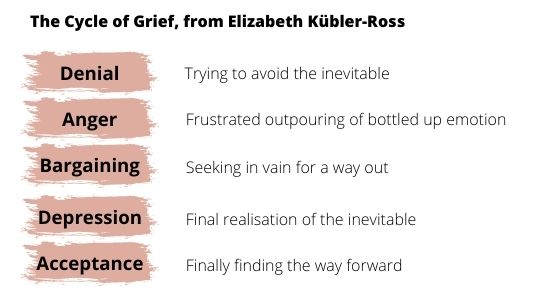
This theory was originally conceived from Kübler-Ross’s observations of working with terminally ill patients. However, it was quickly recognised that it was also relevant to other forms of grief.
We know that grief goes beyond bereavement. Whilst we will inevitably grieve the death and loss of loved ones, we can also grieve the living. We can grieve the loss of relationships, or the loss of those who in one way or another, are ‘not who they used to be’. We can grieve places, or times in our lives that we wish we could go back to. We can grieve the way things used to be. We can grieve the dreams that we had for ourselves, which never eventuated. We can grieve what we used to ‘know’, which somehow or in some way, is no longer the truth.
In recovery from an eating disorder, we may find ourselves grieving many, if not all of these things, all at once.
Let’s put the model to the test. In eating disorder recovery, we may experience….
Denial, that there is a problem at all.
Anger, at being told we need to change. Maybe anger at ourselves, for the damage that we or others have done to us.
We may Bargain with ourselves, or others. “Ok, I will eat that, but only if I also go for a run”, or “right now I’m eating everything in my sight, because the diet starts tomorrow!!”.
We may experience Depression; when running around and around on the hamster wheel of all of the above just doesn’t. change. a. damn. thing.
And as we recover, we can move to Acceptance. Acceptance of the things that we cannot change. Acceptance of our bodily needs. Acceptance that we even have a body that has needs. Acceptance of this body, as it is, right now. Acceptance of our emotional needs, or that we have emotions at all. The list goes on.
I like the Kübler-Ross model, I think it can be usefully applied in many contexts, and it makes sense.
Yet, there is something that gnaws at me. That acceptance bit. I mean, I “get it”. I can see what that might be, in theory. It sounds really lovely.
But what I’ve asked myself for a long time, is how the f*%king hell do you get there??
How do you get there when the thing that has been lost, feels like such an enormous and integral part of you? How do you get there when every ounce of your being just cannot, will not and does not want, to let go?
My whole life, I’ve heard people talk about this idea of ‘closure’.
This idea that a particular moment or event can transpire; kicking in to gear a mysterious inner mechanism which allows that final internal shift. So that *abracadabra*, you are magically released and let go; unburdened by that old wound or pain and ready to skip off in to the sunset, walking in to a new chapter of your life.
I’m sorry, but I call bullsh*t on that.
Rarely, if ever, have I personally experienced a feeling of closure. Moreover, I’m not convinced that I’ve witnessed anyone else experience it either.
If we’re talking about the loss of a loved one, through death, illness or relationship breakdown; how can we ever speak about closure, or acceptance? When you love and then lose, that love doesn’t disappear. Can we or would we ever suggest that it should?
What about other types of grief though? When it’s not bereavement, but rather, what I am calling here, the grief of recovery?
In eating disorder recovery, we grieve the way that things used to be. We grieve the body that we used to have. Or, at least the one we feel we should have, or that we feel entitled to have. We grieve the dreams that we have had, of who we think we are supposed to be. We grieve the time that has been lost. We grieve the beliefs and thoughts we had which once seemed so true, but as it turns out, were not. We grieve the friend, the companion and the coping mechanism that our eating disorder has become. We grieve being ‘right’. We grieve the relationships that we have harmed, perhaps most of all, the one that we have with ourselves.
In the face of this grief, we have two options, as I see it.
The first option, is do nothing. Change nothing.
The second option, is to change. Change something. Even if it’s challenging, difficult, painful and makes you question everything.
This second model of grief, let’s call it the *circle of grief, tells a much simpler but I think effective story.
(*Whilst I have drawn this diagram, I didn’t personally come up with the idea. I haven’t been able to find who to credit this to, if you know, then please let me know).

When we are confronted with grief or loss, we can deny reality. We can stay in a stage of denial. We can cling to our thoughts and beliefs because they are comfortable and because to change them is too painful.
Yet as we do this, we stay small. Life doesn’t move forward. The days blend in to one and we run around the hamster wheel of our minds, looking for a way, ANY WAY to continue to cling to what we so stubbornly know.
The other option, is to admit that we might have been wrong about some stuff. Ugh. Who wants to do that though?? No thank you.
So, we are stuck.
The thing that I have come to notice in myself and in others, is that what most people want is to be congruent.
We all want to feel as though our beliefs and actions make sense. WE want to make sense. No one likes to admit that they might have been wrong, or that their thoughts or actions may have been incorrect, or even worse, harmful. So, we double down on what we have always done.
Yet in staying congruent, the trade-off is that we begin to calcify. We become rigid, immovable and rough around the edges. If we’re not careful (honestly), we can become a real d*ck to be around.
Yet it’s hard to let go, it’s hard to admit that we might have been wrong and that there are things we could or even should do better. Perhaps the fear, is “what does this say about me, if I was wrong?”. Or “Who am I if I was wrong?”. Or “What else could I be wrong about, if I am to admit to being wrong about this?”. Or “What can I be certain about?”. Or “Is there even such thing as certainty at all?”
It’s scary.
This is where I have personally found the circle of grief useful.
With this model, no longer do I have to shun, neglect or turn my back on old versions of myself. No longer do I have to say goodbye to the people that I have lost, the identities I once had, the dreams, thoughts or beliefs that I once had. No, in this model, those things simply become a smaller and contextualised part of the bigger picture of who I am now. Who I am, becomes a more nuanced and complex person who continues to grow and learn.
In the circle of grief, I am able to reconcile the losses of people, places, dreams, thoughts and identities. They are, in some ways, still a part of me. In turn, where there was once fear, resistance and rigidity; there is now a growing capacity to see the shades of grey. There is now the capacity to open my heart to uncertainty and to accept that sometimes (a.k.a. always), there is no real “truth”. That what was true for me back then, is still true for me back then, AND (not but), I have now grown beyond that.
With the circle of grief, I don’t need so-called closure. Doors never need to shut, and chapters never need to close, or even open for that matter. My memories, experiences, and identities live on inside me, in a quantum realm which is abundant and expansive; it doesn’t run out of room. Each time I revisit their memories, they change just a little, and as they change, they evolve with me and are part of my story.
There will be growing pains, no doubt. All growth is painful. Whilst I have personally experienced many losses, I see now, that it had to be this way. If I had not allowed those losses to happen, I would have stayed stuck. Small, scared and clinging to the kind of certainty which at the end of the day, was only a myth anyway.
In some ways now, I am left with a paradox.
In accepting the uncertainty of life, I allow my heart to open, which surely can only be a good thing. Yet, in some ways, the more I gain, the more I stand to lose. It’s not easy, and some days, it feels like a constant negotiation.
Nonethless, I am more equipped than ever before, to take on that challenge. I guess it’s a bit like the saying, “better to have loved and lost, than to have not loved at all”. I am ready to love.

In recovery, I am bigger. My body is bigger. My heart is fuller. My eyes are wider. I know that through all the blood, sweat, tears and mess of it all, that my life is expanding.
You still haven’t mentioned anything about conspiracy theories I hear you say?
When I decided to write this piece, the main focus was on grief and recovery. In our current climate however, the conspiracy theories……well they just kept knocking at my door louder and louder, insisting their enmeshment, until I could no longer ignore them.
How so? Here is how I see it.
In the midst of uncertainty and chaos, we want answers. We want to know, what is the truth? How can we protect ourselves? Who can we blame and how do we make sure this never happens again?
From these questions, flows a natural dichotomy. Who is right and who is wrong? Who has the answers, versus who is “asleep”? The battles begin. Are you anti or pro science? Are you anti or pro vaccinations? Are you anti or pro Bill Gates? Are you anti or pro wearing masks?
Big questions, and questions which as I see it, are not terribly different to the questions and decisions we must make in recovery. Do I choose pain or avoidance? Do I choose to feel this emotion or push it away? Do I diet or go down the anti-diet path? Is this food good or bad? Is my body good or bad? Am I good or bad?
The dichotomies continue.
Perhaps the truth lies somewhere in the middle, and actually, you don’t have to decide.
Or more to the point; you can decide, but then you can decide to change your mind. This is assertiveness 101.
Allowing yourself to be open to the possibilities is an uncomfortable middle ground, where sometimes there are no answers; at least none that feel satisfying.
Every day we gain access to new information, and sometimes that information makes what we thought we knew, wrong. Sometimes it confirms what we think we know, but which again, can always be disproven, when we learn more. Just like in the grief of recovery.
When we cling to old ideas, we stay small. However, if we open our minds, and don’t allow ourselves to become too dogmatic on either side, our lives can grow.
In the absence of truth, what can we rely on?
You’re not going to like my answer, because I don’t have an answer. This is for you to decide.
For me, rather than look for certainty or answers, what I do instead is aim for a few things these days. Humility, tolerance, open-mindedness, flexibility, kindness, compassion, self-compassion and respect. These are just a few things. I’m not going to pretend I always get there, or that I ever will. Nor do I think these aims will remain static, perhaps I will add to or change them as my circle grows.
For now, this is the size of my circle. In another year, and then ten years from now, I would like to think that my circle will have continued to grow. That the griefs, losses and everything that I have learned along the way will stay inside me, contributing to my evolution. That along the way, what I will get closer and closer to, is a growing sense of internal trust. That everything will work out, as it is supposed to.
You may agree with everything I have written here, maybe nothing. I suggest you shoot for somewhere in the middle. In recovery and in living, perhaps all you can do is keep your mind open. We don’t know what might be possible.


.jpeg)
